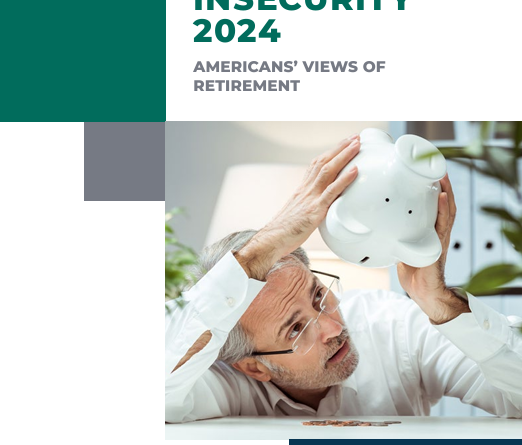Retirement insecurity 2024 americans’ views of retirement
By Dan Doonan & Kelly Kenneally
T he ground is shifting when it comes to retirement. Most Americans are experiencing increased financial pressures “I am scared to be broke.” Dream. Eighty-three percent of Americans say that all workers should have a pension so they can be and low levels of retirement savings. Amid growing concerns about Americans’ retirement readiness, policymakers recently enacted measures to help address the grave savings shortfall. On the federal level, Congress passed important retirement legislation in 2019 and again in 2022. Meanwhile, some 19 states have enacted legislation in recent years establishing new state-facilitated retirement plans for private sector workers who lack retirement plans through their employer. And in late 2023, IBM shocked the retirement world by announcing the company would reopen its defined benefit (DB) pension plan and end its defined contribution (DC) 401(k) matching contributions, a trend that also is occurring in the public sector. Meanwhile, the 2023 Social Security Trustees Report indicated that the main trust fund’s reserves will be depleted in 2033, one year earlier than estimated last year. The financial sustainability of Social Security is critically important because it provides a sizeable portion of retirement income for a large share of Americans. Against this backdrop, the National Institute on Retirement Security (NIRS) conducted a national public opinion poll of working age Americans to assess their views on key retirement issues. This survey research finds: • Americans express strong support for pensions. More than three-fourths of Americans have a favorable view of pensions, while 77 percent agree that the disappearance of pensions makes it harder to achieve the American independent and self-reliant in retirement. • High retirement anxiety continues among Americans. When asked if the nation faces a retirement crisis, 79 percent of Americans agree there indeed is a retirement crisis, up from 67 percent in 2020. More than half of Americans (55 percent) are concerned that they cannot achieve financial security in retirement. When it comes to inflation, 73 percent of respondents said recent inflation has them more concerned about retirement. • Americans want policy leaders to give their retirement concerns a higher priority. The vast majority of Americans (87 percent) say leaders in Washington don’t understand how hard it is for workers to save for retirement, up from 76 percent in 2020. Also, 86 percent say Washington leaders need to focus more on retirement and give it a higher priority on the policy agenda, again up from 2020 (76 percent). Most Americans (84 percent) say government should make it easier to offer pensions to their workers, up from 76 percent in 2020. • Americans want action now to safeguard Social Security. Eighty-seven percent of Americans say Congress should act now to shore up funding rather than waiting another ten years to find a solution. Also, 87 percent say the program must remain a priority no matter the state of federal budget deficits. When it comes to expanding Social Security, slightly more than half of Americans (52 percent) agree with this concept.RETIREMENT INSECURITY 2024 2 • Americans are worried about long-term care costs in retirement. Eighty-seven percent are concerned generally about rising costs, while 80 percent are worried about the rising cost of long-term nursing care. A large share of Americans (66 percent) are worried about rising healthcare costs in retirement, 75 percent are concerned about rising housing costs in retirement, and 66 percent are worried about increasing costs to get help with everyday chores like cleaning and cooking.
Read the book here











